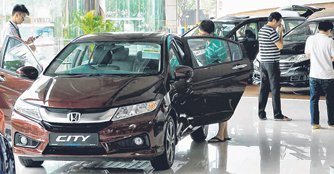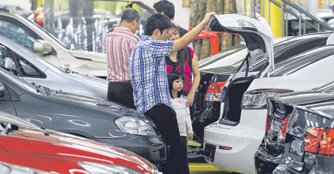Low COE prices could drive more to scrap cars prematurely
07 Jul 2018|17,180 views
Jon Yeo's pearl-white Toyota Wish - a popular seven-seater - is barely two-years old, but he is considering swopping it for a brand new car. With Certificate of Entitlement (COE) prices having plunged to their lowest in nearly a decade - $25,000 for smaller cars and $31,000 for bigger models - car owners like Mr. Yeo are redoing their sums.
Mr. Yeo, a 49-year old bank officer, said, "When I bought the car in November 2016, COE was $50,000-plus. I paid around $119,000."
"If I get rid of it and buy a new car, the annual depreciation might be lower, and I may be better off. I'm seriously considering it."
The Wish is no longer available, but Toyota agent Borneo Motors is now retailing the petrol-electric Prius+ hybrid seven-seater from just over $98,000.
Mr. Yeo is not alone. With the drop in COE prices, motorists who bought their cars between 2014 and 2016 - when premiums were as high as $90,000 - are finding it more attractive to switch to a new ride now.
Motor industry players, however, said these cars will have to be deregistered and exported to other countries. This is because they will get a refund on the unused portion of their COE. Each COE is valid for 10 years.
Neo Tiam Ting, President of the Automotive Importers and Exporters Association said, "By scrapping their cars, they get a better price than selling them here. We are seeing a lot of 2015 and 2016 cars being exported. If the low-COE trend continues, maybe even 2017 cars will start to be scrapped."
Mr. Neo Nam Heng, Chairman of diversified motor group Prime, concurred. He said cars registered between 2013 and 2015 form the bulk of export-bound cars, with the Honda Vezel being one of the top models. Others include the Jaguar XJ, Audi Q7 and Audi A6, he said.
Besides the COE rebate, owners who deregister their cars get up to 75 percent of its additional registration tax - a car's main tax. Mr. Neo said the vehicle itself will also fetch a decent price. "A Toyota Camry and Altis will fetch around $10,000, a Honda Vezel $13,000 and an Audi Q7 up to $21,000," he said.
COE premiums for cars are now at their lowest since March 2010, following the latest results on Wednesday. Industry players attribute the falls in COEs largely to an emission ruling that went into effect last Sunday (1st July). New cars are now measured for the particulate matter they produce, on top of carbon dioxide, carbon monoxide, hydrocarbons and nitrogen oxides.
Mr. Neo said if COEs remain low, "history will repeat itself", referring to the huge exodus of cars between 2000 and 2005 when more than 500,000 fairly new vehicles - bought when COEs were at record levels of $110,000 in the late-1990s - left Singapore.
Cogent Automotive Logistics, which operates one of two vehicle export-processing zones here, said the number of cars stored at its yard awaiting shipping has risen significantly. "This year, our volume has increased by 30-40 percent, to around 400 cars now," a Cogent spokesman said. While this is still nowhere as high as the record years of 2004-05 - when it processed around 2,000 cars a month - the spokesman said the increase reflects an emerging trend. He revealed that the newer cars streaming in included those from Uber's Lion City Rentals.
Prime group's Mr. Neo said that low COE prices will also give rise to another trend: owners of older cars - those nearing 10 years - keeping them beyond the 10th year. This is because the cost of paying the prevailing quota premium - an average COE price - will be lower. "We will have a situation where older cars stay, and newer ones leave the country," he said, adding that that will not be good for the environment.
Jon Yeo's pearl-white Toyota Wish - a popular seven-seater - is barely two-years old, but he is considering swopping it for a brand new car. With Certificate of Entitlement (COE) prices having plunged to their lowest in nearly a decade - $25,000 for smaller cars and $31,000 for bigger models - car owners like Mr. Yeo are redoing their sums.
Mr. Yeo, a 49-year old bank officer, said, "When I bought the car in November 2016, COE was $50,000-plus. I paid around $119,000."
"If I get rid of it and buy a new car, the annual depreciation might be lower, and I may be better off. I'm seriously considering it."
The Wish is no longer available, but Toyota agent Borneo Motors is now retailing the petrol-electric Prius+ hybrid seven-seater from just over $98,000.
Mr. Yeo is not alone. With the drop in COE prices, motorists who bought their cars between 2014 and 2016 - when premiums were as high as $90,000 - are finding it more attractive to switch to a new ride now.
Motor industry players, however, said these cars will have to be deregistered and exported to other countries. This is because they will get a refund on the unused portion of their COE. Each COE is valid for 10 years.
Neo Tiam Ting, President of the Automotive Importers and Exporters Association said, "By scrapping their cars, they get a better price than selling them here. We are seeing a lot of 2015 and 2016 cars being exported. If the low-COE trend continues, maybe even 2017 cars will start to be scrapped."
Mr. Neo Nam Heng, Chairman of diversified motor group Prime, concurred. He said cars registered between 2013 and 2015 form the bulk of export-bound cars, with the Honda Vezel being one of the top models. Others include the Jaguar XJ, Audi Q7 and Audi A6, he said.
Besides the COE rebate, owners who deregister their cars get up to 75 percent of its additional registration tax - a car's main tax. Mr. Neo said the vehicle itself will also fetch a decent price. "A Toyota Camry and Altis will fetch around $10,000, a Honda Vezel $13,000 and an Audi Q7 up to $21,000," he said.
COE premiums for cars are now at their lowest since March 2010, following the latest results on Wednesday. Industry players attribute the falls in COEs largely to an emission ruling that went into effect last Sunday (1st July). New cars are now measured for the particulate matter they produce, on top of carbon dioxide, carbon monoxide, hydrocarbons and nitrogen oxides.
Mr. Neo said if COEs remain low, "history will repeat itself", referring to the huge exodus of cars between 2000 and 2005 when more than 500,000 fairly new vehicles - bought when COEs were at record levels of $110,000 in the late-1990s - left Singapore.
Cogent Automotive Logistics, which operates one of two vehicle export-processing zones here, said the number of cars stored at its yard awaiting shipping has risen significantly. "This year, our volume has increased by 30-40 percent, to around 400 cars now," a Cogent spokesman said. While this is still nowhere as high as the record years of 2004-05 - when it processed around 2,000 cars a month - the spokesman said the increase reflects an emerging trend. He revealed that the newer cars streaming in included those from Uber's Lion City Rentals.
Prime group's Mr. Neo said that low COE prices will also give rise to another trend: owners of older cars - those nearing 10 years - keeping them beyond the 10th year. This is because the cost of paying the prevailing quota premium - an average COE price - will be lower. "We will have a situation where older cars stay, and newer ones leave the country," he said, adding that that will not be good for the environment.
Latest COE Prices
June 2025 | 2nd BIDDING
NEXT TENDER: 09 Jul 2025
CAT A$98,124
CAT B$116,670
CAT C$65,000
CAT E$116,889
View Full Results Thank You For Your Subscription.





















